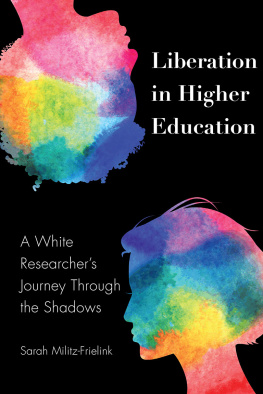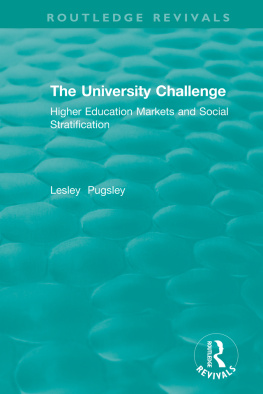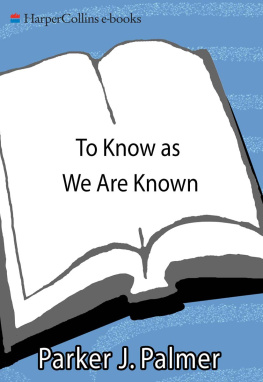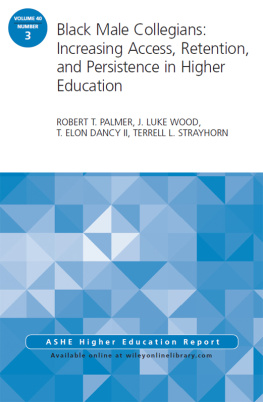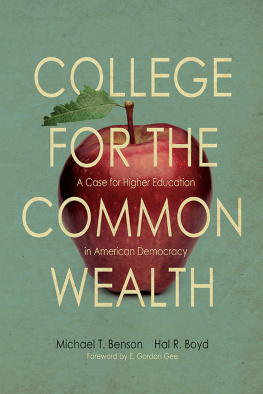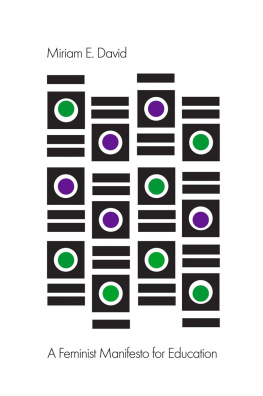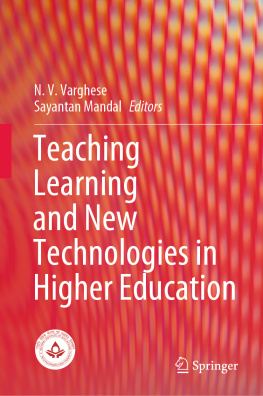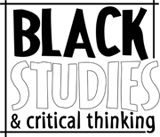Contents
Page List
Rochelle Brock and Cynthia Dillard
Executive Editors
Vol. 113
The Black Studies and Critical Thinking series
is part of the Peter Lang Education list.
Every volume is peer reviewed and meets
the highest quality standards for content and production.
Sarah Militz-Frielink
Liberation in
Higher Education
A White Researchers Journey
Through the Shadows
Library of Congress Cataloging-in-Publication Data
Names: Militz-Frielink, Sarah, author.
Title: Liberation in higher education: a white researchers journey
through the shadows / Sarah Militz-Frielink.
Description: New York: Peter Lang, 2019.
Series: Black studies and critical thinking, vol. 113 | ISSN 1947-5985
Includes bibliographical references.
Identifiers: LCCN 2019011134 | ISBN 978-1-4331-5860-5 (hardback: alk. paper)
ISBN 978-1-4331-5861-2 (ebook pdf) | ISBN 978-1-4331-5862-9 (epub)
ISBN 978-1-4331-5863-6 (mobi)
Subjects: LCSH: Feminism and higher education.
Education, HigherResearchMethodology.
African American womenEducation (Higher)
Discrimination in higher educationUnited States.
BlacksRace identity. | Dillard, Cynthia B., 1957
Classification: LCC LC197.M54 2019 | DDC 378.0082dc23
LC record available at https://lccn.loc.gov/2019011134
DOI 10.3726/b14308
Bibliographic information published by Die Deutsche Nationalbibliothek.
Die Deutsche Nationalbibliothek lists this publication in the Deutsche Nationalbibliografie; detailed bibliographic data are available on the Internet at http://dnb.d-nb.de/.
2019 Peter Lang Publishing, Inc., New York
29 Broadway, 18th floor, New York, NY 10006
www.peterlang.com
All rights reserved.
Reprint or reproduction, even partially, in all forms such as microfilm, xerography, microfiche, microcard, and offset strictly prohibited.
About the author(s)/editor(s)
Sarah Militz-Frielink earned her Ph.D. from the University of Illinois at Chicago and currently teaches at Northern Illinois University. Her co-authored book Borders, Bras, and Battles earned an honorable mention for the 2016 Society of Professors of Education Outstanding Book Award. In addition to several journal articles, she published a National Learning Series titled African Americans in Times of War: Triumphs in Tragedy.
About the book
Liberation in Higher Education introduces and expands on the notion of Endarkened Feminist Epistemology (EFE) based on a qualitative case study of Cynthia B. Dillard and her students as well as the white researcher and author, Sarah Militz-Frielink, as she became transformed through her research in higher education. Dillard, who created EFE as a teaching and research paradigm in 2000, grounded it in several frameworks: Black feminist thought, standpoint theory, the tenets of African American spirituality, and the work of Parker J. Palmer on non-religious spirituality in education. The book delves into EFEs origins and students meaning-making experiences with EFEincluding related themes such as healing, identity development, cultural histories, spirituality, and the evolution of the phenomenon over time. This book also includes a chapter in which Militz-Frielink applies EFE as a methodology to herself, which is one of the recommended practices of EFE as a research tool. Liberation in Higher Education concludes with implications and recommendations for practitioners, particularly white practitioners in higher education who work with African American students in predominantly white institutions.
This eBook can be cited
This edition of the eBook can be cited. To enable this we have marked the start and end of a page. In cases where a word straddles a page break, the marker is placed inside the word at exactly the same position as in the physical book. This means that occasionally a word might be bifurcated by this marker.
| v
This book is dedicated to Dr. William H. Watkins (October 19, 1946-August 5, 2014), who inspired his students through his life as an activist/scholar concerned about social change. His publications, activist work, and lectures gave me hope that I, too, could someday live more courageously and write more dangerously.
| xi
My thanks and gratitude go to my family, especially my parents, my brother, and my children Gabriel, Grace, and Hannah, for their love and patience during the hours I spent traveling and writing to finish this research. I would like to thank my dissertation committeeDr. Danny B. Martin, Dr. Alfred W. Tatum, Dr. David Stovall, Dr. Karsonya Wise Whitehead, and Dr. Conra Gistfor their unconditional support and scholarly advice. Words cannot express how grateful I am to have the privilege of learning from such great minds who came together for the sake of this project. I would especially like to express gratitude to the chair of this committee, Dr. Danny B. Martin for having the fortitude and patience to work with me under difficult circumstances (i.e., when my previous advisorUICs beloved William H. Watkinspassed away unexpectedly in 2014). We were all grieving and Dr. Martin courageously took on a tremendous amount of responsibilities at UIC. Despite the heavy workload, Dr. Martin continuously put his students first and gave meaningful feedback on our theses and dissertations in a timely matter, which inspired us to continue our inquiries with a sense of purpose. For that I am eternally gratefulto have known a professor xi | xii and chair of a department who invested so much time and energy in his graduate students. It is rare to meet a professor like that in the academy today as so many are tied up in politics or their own inquiries. It is more rare to have one as chair of ones dissertation committee; I am beyond blessed. Special thanks to my precious mentor Dr. La Vonne I. Neal, who introduced me to Dillard and helped me to stay on the path for love and justice.
| xiii
AERA American Educational Research Association
ASALH Association for the Study of African American Life and History
EFE Endarkened Feminist Epistemology
NCC National Curriculum Council
UGA University of Georgia, Athens
| 1
The art of teaching embodies a spiritual essence that is frequently suppressed, erased, or replaced by an increasingly mechanistic model of teaching (Counts, 1932/1969; Dewey, 1929/1999; Gardner, 2000; hooks, 2003; Mayes, 2005). The word spiritual comes from the Latin word spiritus, meaning breath, and the Greek word penuma, meaning air or wind. The etymological roots reflect the breath of life concept of the soul. At the most fundamental level, this concept distinguishes the animate from the inanimate, and the transcendent from the immanent. When disentangled from its longstanding religious connotations, the concept of spirituality can be framed in relation to teaching as a precondition for educating the whole person (Dewey, 1929, p. 9).
The idea of spiritualityespecially the non-religious kindin schools is not a new concept to the sphere of education (Dewey, 1929/1999; Hill, 1989; hooks, 1994; Lewis, 2000; Mayes, 2005; Palmer, 1983; Tisdell, 2006; White, 1996). For example, in 1993 the National Curriculum Council (NCC) published a document on spiritual and moral development which emphasizes the applicability of the word spiritual to all pupils within the domain of public education in the United Kingdom. The thrust of this document is to legitimize the non-religious spiritual aims of education: 1 | 2

